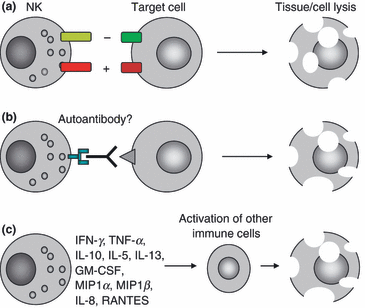Natural killer cells in human autoimmune diseases
- PMID: 21039469
- PMCID: PMC2999796
- DOI: 10.1111/j.1365-2567.2010.03360.x
Natural killer cells in human autoimmune diseases
Abstract
Natural killer (NK) cells have been implicated in tumour surveillance and in the early control of several microbial infections. In autoimmune disease their involvement in these processes has been evaluated in animal models, with conflicting results. Both a disease-controlling and a disease-promoting role have been suggested. In human autoimmune disease only a few studies, mainly descriptive, have demonstrated qualitative and quantitative modification of NK cells. These changes were observed on blood- or tissue-infiltrating NK cells. Taken together with our expanding knowledge of the genetical variability of NK cell receptors and NK cell physiology, these findings pave the way for the dissection of the role of NK cells in human autoimmune diseases. NK cells may be directly involved in these diseases through their potential autoreactivity or through their interaction with dendritic cells, macrophages or T lymphocytes, thereby inducing excessive inflammation or favouring the adaptive autoimmune response. Thus, NK cells may be implicated in the onset, the maintenance or the progression of autoimmune diseases. Some reports also suggest the involvement of NK cells in the treatment of human autoimmune disease by biotherapies. All these observations suggest that NK cells are involved in the complex processes of autoimmune diseases. Nevertheless, further careful analysis of NK cells at different steps of these diseases, in different tissues and through combined genetical and functional studies will contribute to a better understanding of their role in autoimmune diseases. This knowledge might allow the development of new therapeutic strategies based on NK cells for the treatment of some autoimmune diseases.
© 2010 The Authors. Immunology © 2010 Blackwell Publishing Ltd.
Figures



References
-
- Arbuckle MR, McClain MT, Rubertone MV, Scofield RH, Dennis GJ, James JA, Harley JB. Development of autoantibodies before the clinical onset of systemic lupus erythematosus. N Engl J Med. 2003;349:1526–33. - PubMed
-
- Shmerling RH. Autoantibodies in systemic lupus erythematosus--there before you know it. N Engl J Med. 2003;349:1499–500. - PubMed
-
- Middleton D, Meenagh A, Moscoso J, Arnaiz-Villena A. Killer immunoglobulin receptor gene and allele frequencies in Caucasoid, Oriental and Black populations from different continents. Tissue Antigens. 2008;71:105–13. - PubMed
-
- Cooper MA, Fehniger TA, Caligiuri MA. The biology of human natural killer-cell subsets. Trends Immunol. 2001;22:633–40. - PubMed
Publication types
MeSH terms
Substances
LinkOut - more resources
Full Text Sources
Other Literature Sources
Medical

